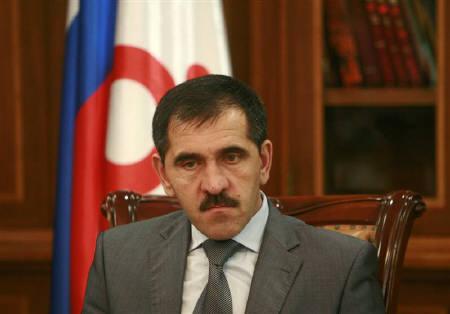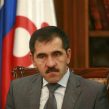
Political Forces in Ingushetia Demand More Say in Republic’s Affairs
Publication: Eurasia Daily Monitor Volume: 9 Issue: 45
By:

On March 3, Russia’s Anti-Terrorism Committee (NAK) preliminarily confirmed the killing of another leader of Ingushetia’s militants, Adam Tsyzdoev. Tsyzdoev and another rebel were killed by the security services in the northern Ingushetian town of Malgobek. The militants reportedly fired shots at police who tried to stop their car and were killed by return fire (https://ria.ru/defense_safety/20120303/584242832.html, March 3).
The situation in Ingushetia remains tense despite a considerable decrease in the number of attacks during the past nearly two years since the well-known Ingush militant leader Ali Taziev (aka Ali Yevloev, Emir Magas) was captured by the Russian security services in June 2010. Meanwhile, local opposition to the head of the republic, Yunus-Bek Yevkurov, has become more vocal, as the public grows impatient with his promises to improve economic conditions and the rule of law.
On February 29, a voter’s organization in Ingushetia urged the republic’s residents to boycott the Russian presidential elections on March 4. The rationale they gave was that if Yevkurov did not provide a sufficient turnout and number of votes for Vladimir Putin, the latter would replace him. The organization’s appeal began: “You, disenfranchised stepchildren of the Russian state!” (https://ingushetiyaru.org/news/22750.html, February 29).
The feeling that ethnic Ingush have a pariah status in Russia is very pervasive in Ingushetia. On February 28, Ingush civil activists from the organization Mekhk Khel (People’s Council) addressed Russian President Dmitry Medvedev and Prime Minister Vladimir Putin. “Supported by the federal center in everything, North Ossetia has become a gendarme of our region,” the activists stated. “Especially regarding the Ingush side. It is not a secret to us that even important cadre decisions in Ingushetia in the past decades have been dictated by the Ossetian side.” The authors of the appeal urged Moscow to stop playing to North Ossetia’s whims and disregarding Ingush interests. They warned that if Moscow did not take into account Ingushetia’s interests, there would be no improvement in the political, economic or criminal situation in the republic (https://ingushetiyaru.org/news/22734.html, February 28).
The neighboring North Caucasus republics of Ingushetia and North Ossetia have had a long-standing territorial dispute over the Prigorodny district, which was transferred to North Ossetia from Ingushetia following Stalin’s deportation of the Ingush people in 1944. In 1992, tensions in the district erupted into an armed conflict that resulted in tens of thousands of the ethnic Ingush being driven out of the Prigorodny district. Since then, the conflict has been officially declared “solved” by Moscow several times, but the issues of refugees and political settlement have remained extremely sensitive in Ingushetia.
On March 2, Yevkurov met with Ingush bloggers in an apparent recognition of the growing influence of the Internet in the North Caucasus. Probed by one of the bloggers about having endorsed the Prigorodny district’s incorporation into North Ossetia, Yevkurov responded that the district was part of North Ossetia officially because the Russian law on rehabilitation of repressed people had not been implemented. Yevkurov further distanced himself from recognizing the Prigorodny district as part of North Ossetia, saying that his original words had been misinterpreted (https://www.kavkaz-uzel.ru/blogs/342/posts/10825, March 2).
February 23, the anniversary of the 1944 mass deportation of the Ingush and their ethnic cousins, the Chechens, to Central Asia by Stalin for alleged collaboration with Nazi Germany, has become a focal point for Ingush activists. After the Ingush and Chechens were rehabilitated by Nikita Khrushchev in 1957 and both groups started to return to their ancestral territories, many discovered that their houses had been occupied by other people. The mass population movements caused numerous territorial problems between Chechnya and Dagestan, Ingushetia and North Ossetia, and even between Chechnya and Ingushetia. Ingush activists now call the 1944 deportation “genocide” (https://ingushetiyaru.org/news/22747.html, February 27).
Meanwhile, February 23 was designated as an official holiday in Russia, celebrating the Russian army. This past February 23, in Tbilisi ethnic Chechens and Ingush living in Georgia and several Georgian civil organizations participated in a march in Tbilisi to commemorate the victims of the expulsions. Georgia is trying to play a more active role in the North Caucasus and marches like this are currently possible only on Georgian soil, but not in Ingushetia or Chechnya, where the expulsions took place (https://www.kavkaz-uzel.ru/articles/201735/, February 23).
The rise of the Mekhk Khel organization, which is also called Ingushetia’s “alternative parliament,” is a sign that the situation in the republic has become critical. On February 21, Yevkurov met Mekhk Khel representatives. The political activists handed him 11 demands to Yevkurov and stated that support for Yevkurov would depend on his reaction to their demands, which included the dissolution of all legislative bodies due to the illegitimate Russian parliamentary elections of December 2011 and providing conditions for free and fair elections. Also the activists urged Yevkurov to take action to solve territorial disputes with North Ossetia and Chechnya, complaining about the “creeping occupation” of Ingushetia by Ossetians. Mekhk Khel stated that they would initiate a referendum on territorial issues in Ingushetia. The activists addressed theissue of lawlessness, as kidnappings of suspected rebels by the security services continue in the republic (https://ingushetiyaru.org/news/22739.html, February 25).
The interaction between the Ingush authorities and the opposition illuminates the urgent need for political reform in the North Caucasus that would introduce a more participatory political regime in the region. The absence of representative government appears to be the North Caucasus’ single greatest problem, which is stalling the development of the region and contributing to its intractable destabilization.




